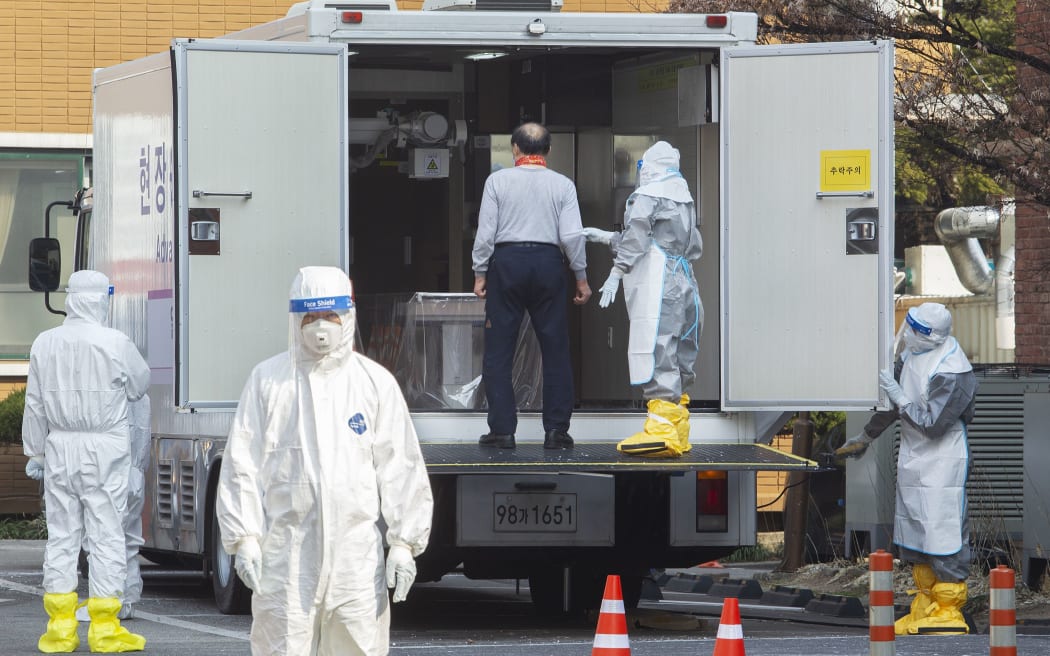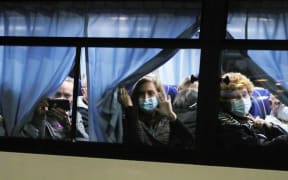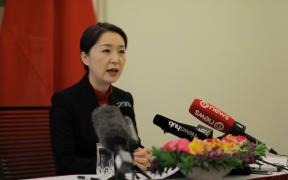South Korea has reported a large boost in the number of covid-19 coronavirus cases, the majority of which have been linked to a minor Christian sect in the country.

A person with symptoms of suspected coronavirus infection is being examined by hospital personnel in South Korea. Photo: AFP
Authorities confirmed 73 new cases, 42 of which were directly or indirectly connected to Shincheonji Church of Jesus, the Temple of the Tabernacle of the Testimony - a religious movement which worships its founder Lee Man-hee as the second coming of Jesus Christ.
The mayor of the central Korean city of Daegu, where the affected Shincheonji congregation is based, urged its 2.5 million people to refrain from going outside as new cases spiked.
Mayor Kwon Young-jin made the appeal in a nationally televised news conference, pleading for assistance from the central government.
Kwon also asked Daegu citizens to wear masks even indoors if possible.
South Korea's Centres for Disease Control and Prevention described the outbreak there as a "super-spreading event."
According to a statement from the Shincheonji church, leaders have been advising followers since late January to stay at home if they had recently travelled overseas or were experiencing even mild cold-like symptoms.
A 61-year-old woman known as "Patient 31" is thought to have spread the disease to dozens of people who attended religious services at the church.
Patient 31 assumed she was suffering from the common cold and kept coming to her Daegu church because she did not travel overseas, church officials said.
"The Daegu branch has been shut down since this morning and is conducting prevention measures," the statement said.
"We think it's deeply regrettable… for causing concerns to the local community."
One other person, who came in contact with her at a hospital, has also come down with the virus.
"I don't want to oppose the opinion that the Sunday service is essential," said Shin Sung-wook, a professor at Asia United Theological University, as quoted by South Korean news agency Yonhap.
"But I want to point out one thing. Does a church have to be a brick-and-mortar building?"
The Shincheonji church, which claims it has about 200,000 followers in the country, has now closed all of its 74 churches around the nation and told followers to instead watch its online worship services on YouTube.
The explosion of infections in Daegu and the neighbouring south-east region, as well as some new cases in the Seoul metropolitan area where the sources of infections were unclear, have raised concern that health authorities are losing track of the virus as it spreads more broadly in the country.
In a telephone conversation with Kwon, President Moon Jae-in said the central government will make all available assistance to help Daegu fight against the virus' further spread, according to the presidential Blue House.
"We are seeing infections in some areas like Seoul and Daegu where it's difficult to confirm the cause or routes of the infections," Kim Gang-lip, South Korea's Vice-Health Minister, said in a briefing.
"Our judgement is that [COVID-19] which has been introduced from abroad is beginning to spread through community transmissions in limited ranges," he said, adding that the government would need to change its quarantine strategy that has been focused on tracing contacts.
The virus has killed more than 2,000 people, mostly in mainland China, and spread to more than two dozen countries, causing widespread economic and travel disruptions.
Excluding the epicentre of the outbreak in Hubei Province, however, the number of new cases in mainland China has now fallen for 15 straight days.
The South Korean president has called for stringent infection control measures and every possible action to boost the economy, which he said was in an emergency situation as the result of the epidemic.
-ABC





